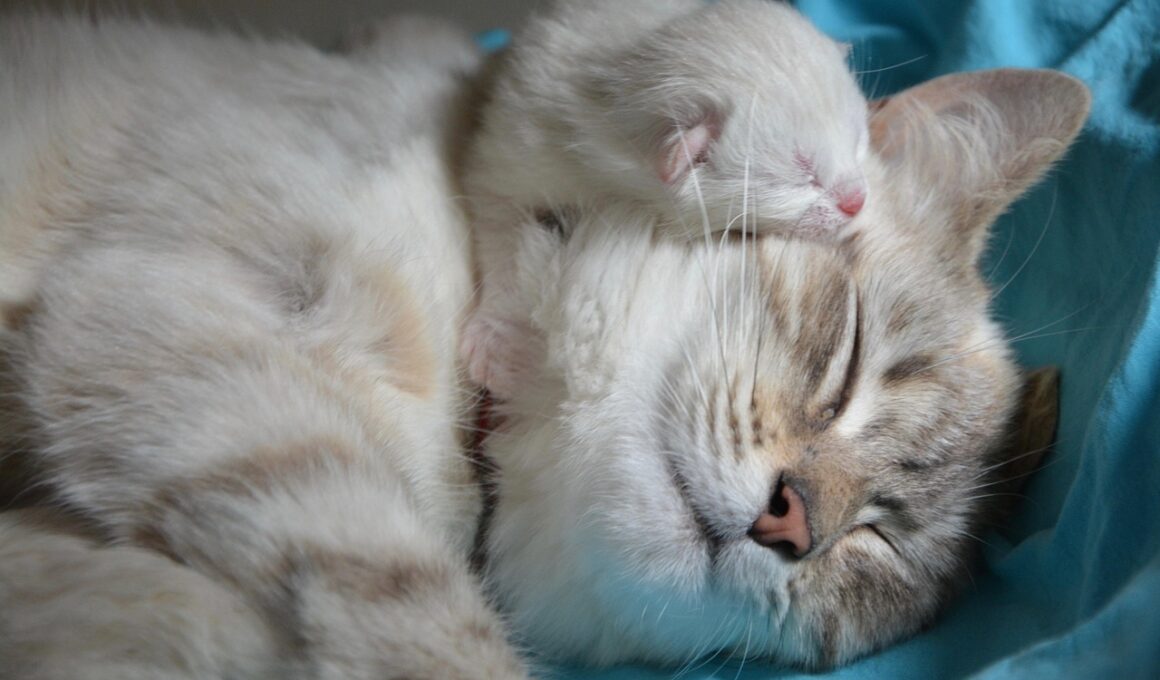The Connection Between Tiny Parasites and Kitten Behavior Changes
Understanding the link between tiny parasites and kitten behavior is essential for any pet owner. Kittens are vulnerable to various parasites such as fleas, mites, and intestinal worms. These pests can cause significant behavioral changes in your new furry friend. Common signs of infestation include excessive scratching, lethargy, and sudden aggression. In fact, parasites can lead to discomfort and frustration, which often manifest as altered behavior. Kittens, being playful and curious creatures, might seem irritable when they are dealing with these invisible attackers. Owners should monitor their pets closely for any changes. A quick examination can help identify the presence of fleas or other parasites. The sooner you treat the issue, the better the chance of restoring your kitten’s normal behavior. Consult with your veterinarian about suitable treatments for parasite prevention and control. Keeping your environment clean will also help reduce the chances of an infestation. Regular vacuuming and washing of bedding are effective preventive measures. Ultimately, a happy, healthy kitten leads to a fulfilling companionship. Addressing any potential parasitic problems should be prioritized by any loving pet owner.
Despite their tiny size, the impact of parasites on kitten health can be significant. Kittens that develop behavioral issues often exhibit signs of distress or discomfort, prompting owners to seek help. These behaviors may include decreased playfulness, withdrawal, or increased aggression. Understanding these changes is crucial for effective training and bonding during early stages. When kittens feel unwell due to parasite infestations, they isolate themselves as a natural coping mechanism. It’s important for cat owners to create an environment where kittens feel safe and secure. Monitoring and addressing signs of discomfort early on can lead to a more stable and less stressful environment. Regular check-ups with veterinarians should emphasize preventive care. Vaccinations are essential, but so is monitoring for parasites. Vets can perform routine fecal exams and recommend preventive medications. Owners need to familiarize themselves with the symptoms of different parasites and seek immediate guidance upon noticing any unusual behavior. Timely intervention can dramatically improve a kitten’s quality of life. Enhanced awareness of the connection between parasites and behavioral changes supports responsible pet ownership and nurtures a strong emotional bond between kittens and their humans.
Physical Symptoms of Infestation
Physical symptoms resulting from parasite infestations in kittens may vary significantly in severity. Commonly seen symptoms include excessive scratching, chewing, or biting at their own fur. This behavior can lead to bald patches or skin infections. Fleas cause intense itching, prompting kittens to scratch incessantly, which can lead to hair loss. Worm infestations, on the other hand, may not be immediately visible. You may notice your kitten having a bloated abdomen or poor weight gain, indicating potential intestinal worms. These signs are often overlooked, as owners focus on daily playfulness without recognizing underlying health issues. Kittens may also display signs of discomfort by being less active and suddenly having lower energy levels. Owners should welcome playtime but watch for abrupt changes. Bringing any noticeable symptoms to the attention of a veterinarian ensures proper guidance. Veterinarians can often diagnose infestations using simple exams or tests, sparing kittens from prolonged suffering. The goal is to ensure their playful nature is maintained. Understanding and recognizing these symptoms support proactive health measures during crucial development stages. The right steps promote a happier, healthier environment for both kittens and their caregivers.
Many pet owners might not fully grasp how quickly tiny parasites can affect kittens’ behavior. Fleas can multiply rapidly, leading to significant infestations within days. Once infested, kittens exhibit a negative impact on their daily activities. The inherent instincts of a kitten are to play and explore, but discomfort from parasites can deter these actions. Loss of appetite is another common sign that may accompany behavioral changes. Kittens experiencing discomfort may show less interest in their food, opting for isolation instead. This behavioral cue signals a need for intervention, as maintaining a healthy diet is vital during their growth phase. Owners should routinely examine their kittens, focusing on signs of emotional and physical distress. Regular grooming not only helps to keep the kitten clean but also assists in identifying any potential parasites that may be hidden in their fur. Grooming cultivates a positive bond between kittens and owners, promoting trust. It can also become a routine that makes the kitten feel secure. Overall, awareness and attentiveness to behavioral changes are essential for keeping kittens safe and healthy from these tiny external threats.
The Role of Environment in Prevention
The environment plays a critical role in preventing parasite infestations in kittens. Creating a clean living space significantly reduces the risk of your kitten encountering fleas or other parasites. Regularly vacuuming carpets and upholstery helps eliminate flea eggs and larvae. It’s important to wash bedding and soft toys thoroughly to remove any potential threats. Outdoor spaces can also harbor parasites; thus, managing exposure is key. Limiting outdoor access especially during peak flea seasons helps protect your kitten from infections. Additionally, keeping your garden clean and free of debris prevents rodents, which can act as carriers for fleas and other parasites. It’s essential to foster a controlled environment where kittens can explore safely. Using approved flea prevention products as directed can greatly reduce the chances of infestations. Owners should consult with their veterinarians to find the best preventive solutions available. Proactive measures not only protect kittens but also promote better health and wellbeing. Educating oneself on parasitic risks enables pet owners to create protective environments. Ultimately, a safe and clean environment contributes to a happier life for your kitten.
Behavioral changes resulting from parasite infestations can sometimes affect kittens’ social interactions. Kittens naturally thrive on social opportunities to develop vital skills, including play and empathy. However, if a kitten is experiencing discomfort, it may seem aloof or uninterested in engaging with people or other pets. Infectious behaviors can be mistaken for poor socialization, leading owners to misunderstand their kitten’s needs. In truth, the kitten may experience anxiety due to parasites, prompting withdrawal from playful interactions. Addressing underlying health issues is crucial for fostering healthy social behaviors. Owners should ensure their kittens receive ongoing socialization opportunities. Gradually exposing a kitten to different environments and experiences safely can encourage sociability. Regular training sessions that incorporate positive reinforcement build confident adults from shy kittens. Monitoring behavioral changes during these formative stages can promote healthier interactions in the long term. Seeking advice and support from pet trainers or veterinary behaviorists can also be beneficial. Implementing socialization strategies while treating any potential parasite issues will support overall development. Providing a complete understanding of behavioral dynamics gives kittens a better chance at thriving in their new homes.
Conclusion: Health is Vital for Behavior
To conclude, understanding the connection between tiny parasites and kitten behavior is essential for every pet owner. Kittens that experience parasites often exhibit significant behavioral changes which can affect their well-being. Owners should prioritize regular check-ups for early detection and prevention to ensure the health of their kittens. By cultivating a clean environment and implementing preventive measures, you not only enhance the cat’s quality of life but also strengthen your bond. Recognizing the signs of distress and acting promptly will improve how kittens adapt to their new surroundings. Education about maintaining a parasite-free environment should be integrated into responsible pet care practices for all owners. When kittens feel healthy and safe, their natural behaviors blossom, creating an atmosphere filled with joy and companionship. The significance of monitoring and addressing health issues cannot be overstated, as they play a fundamental role in ensuring that your kitten grows into a well-adjusted adult. A thorough understanding of preventive care will guide owners to provide fulfilling lives for their pets. Kittens deserve loving homes equipped with knowledge and compassion, ultimately nurturing joy for many years to come.
In the journey of caring for a kitten, understanding the connection between health and happiness is crucial for nurturing a vibrant relationship. While tiny parasites can severely disrupt a kitten’s well-being, the right preventive measures and early interventions create a solid foundation for a joyful, long-lasting companionship.


